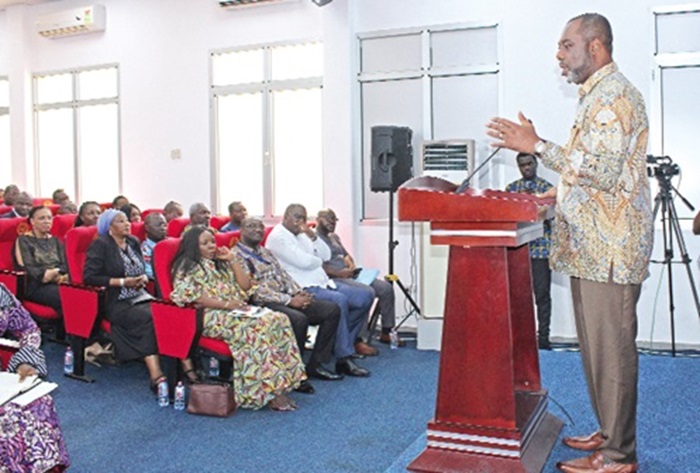The government has signed two new power purchase agreements (PPA) to shore up the country’s power generation by 720 megawatts.
The agreement with AKSA Energy Company Limited for a 370 megawatts (MW) thermal plant in Tema and another 350MW thermal plant in Kumasi is part of the government’s strategy to stabilise and enhance power reliability across the country and encourage power exports.
The Minister of Energy, Dr Matthew Opoku Prempeh, who made this known when he took his turn at the Ministry of Information’s press briefing in Accra yesterday, said the PPA policy was different from previous ones as there would be no buyer and government guarantees, among others.
A PPA is a contract between the public and private sector parties, which underpins a power sector public-private partnership (PPP).
Yesterday’s presentation was dubbed: “Keeping the lights on, keeping the nation moving”.
Dr Prempeh said as part of prudent additions and efficiency enhancement of power generation, some open cycle thermal plants were being converted into combined cycle plants, while the Takoradi T3 thermal combined-cycle power plant, which adds 132MW to the national grid, was also being retrofitted.
That move, he said, would provide environmental benefits and flexibility to operate on multiple fuels.
Renewable energy targets
Dr Prempeh said the country’s current energy mix consisted of hydro, thermal and solar.
“We are growing our electricity consumption rate at about 10 per cent per year.
We are at 88.85 per cent access rate currently and the goal is to hit the Sustainable Development Goal (SDG) target of 90 per cent by 2030.
As we spread energy everywhere, we increase productivity and people prosper,” he said.
The energy minister said a number of solar projects were underway to ensure that the country met its renewable energy target of 10 per cent by 2030.
“We are currently around 3.7 per cent and we want to increasingly shore up our footprint of renewable energy in the country,” he said.
Challenges
Dr Prempeh mentioned some of the power transmission challenges confronting the nation as congestion of networks, over-age infrastructure and encroachment on right of ways.
To overcome the challenges, the government was constructing new transmission lines and bulk supply points and “we are handling the encroachment.
We are improving things to ensure power generated is transmitted efficiently to all parts of the country.”
For power distribution, the minister said, the challenges included high levels of technical, commercial and collection losses.
ECG losses
Projecting a system loss trend analysis of Electricity Company of Ghana (ECG), he said “collection losses were becoming a sticky point which needed to be addressed.”
Per the analysis, ECG’s collection losses hit GH¢2 billion between January and September 2023.
In nine months of 2023, ECG had recorded 28 per cent of system losses, representing more than GH¢4 billion, commercial losses of GH¢2.7 billion and technical losses of GH¢1.2 billion.
“If it was a private company, every day people would be fired because you can’t lose 28 per cent of what you are selling.
How are you going to make a profit,” he said.
o address the issue, Dr Prempeh said the Ministry was working with ECG to undertake a number of reforms and transformation of their operation, including digitising their systems.
ECG has introduced boundary metering to help it account for electricity distribution in particular jurisdictions and reduce technical and collection losses.
Through the work of the ECG revenue protection task force, he said ECG monthly collections had moved from GH¢480 million to GH¢1.1 billion, representing an increase of 130 per cent.
Following a Cabinet approval of a reform agenda, the minister said Nedco and ECG would be linked to form a single distributor in the country.
Petroleum downstream challenge
Pump prices, the minister said, had escalated from GH¢13.92 per litre in October 2022 to GH¢22.74 per litre in November 2022 due to excess forex demand for importation of petroleum products, increased global prices for petroleum products and disruption in global supply chains.
Interventions deployed to address the challenges, he said, included engaging the Bank of Ghana, implementing forex auction window, rollout of the Gold for Oil Programme (G4O) “and we have to commend the NPA for doing a tremendous job.
The work of the NPA has direct bearing on commercial vehicle drivers, fisher folks and all.”
For the petroleum upstream, he said, roadshows had been embarked on across the world to attract investors and a number of Expression of Interests (EOIs) and applications had been received.
Source: Graphiconline

